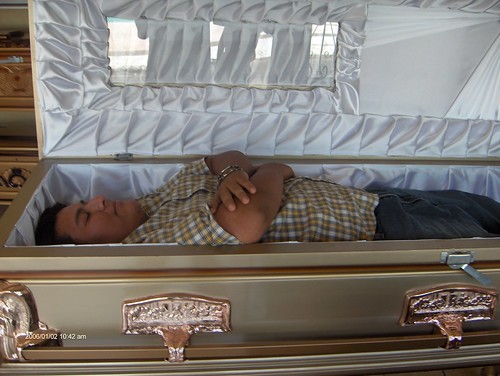
photograph by mirandapablo
The Associated Press scooped all the L.A. papers this morning, following up on a rumor that the gang member who stands accused of killing high school football star Jamiel Shaw might be – wait for it – an illegal alien.
A spokesperson for the federal Immigration and Customs Enforcement agency said the alleged killer may or may not be an illegal alien, and that they may not know for sure for awhile.
The accused killer, Pedro Espinoza, had just finished serving a four month prison term the day before Jamiel was shot. He was serving a sentence for brandishing a weapon and resisting arrest.
So, just to recap, this story now
- Has a youth-on-the-right-path narrative
- Has a youth-on-the-wrong-path narrative
- Contains brown-on-black violence
- Includes a gang member
- Includes a star athlete
- Has an immigration thread
- Has a prison system thread
- Is happening during a spike-in-crime
With the new information about the accused's immigration status, it would be naive to think that Shaw's death will not immediately become a rallying point for anti-immigrant hatred. I predict Lou Dobbs will begin to talk about it in approximately 14 seconds.
Never mind that Espinoza has not been, you know, convicted.
Another aspect likely to be overlooked, due to a combination of Los Angeles's current fog of fear and the coming tsunami of talk show immigration rhetoric, is the total uselessness of the prison system. If Espinoza is indeed the killer, this is someone committing a murder the day after he got out of jail. Taking him as an example – though he's certainly not unique in this sense – it's pretty clear that our prisons do little to discourage recidivism.
It seems to me that the whole concept of imprisonment as a solution to criminal behavior is based on a principle that imprisonment prevents people from committing crimes again. If prisons are not discouraging repeat offenses, what's the point?
Maybe one might think the reason for prisons is just to satisfy a sort of primal need for revenge. But if that's all we require of a post-conviction system, we could put convicts in the stocks and throw rotten fruit at them and then be done with it.
No, imprisonment must have some other goal. But whatever that goal is, it's not being accomplished – and at a cost to California taxpayers of over $10 billion per year, growing 9% annually.
That's one tenth of the state's revenues.

2 comments:
It seems to me that you are asking for a foolproof system that'll keep potential repeat offenders from committing another crime once they get out of jail. While I certainly would be in favor of this system (given that it isn't capital punishment or "lock 'em up and throw away the key" for any offense), it seems impossible for such a system to exist.
Another aspect you're forgetting about why the prison system is there is to prevent people from doing crimes in the first place. Certainly one of the many reasons why I don't go out there any commit a robbery or vandalize a building is the inherent fear of getting caught for doing such an act and being thrown in jail as punishment. If jail clearly isn't strong enough of a deterrent to keep someone from Espinoza from committing a crime in the first place, much less once he gets out of prison, then I think you're looking at a larger problem than merely just the failure of the penitentiary system.
As per your second point: Yes, I think the prison system fails grandly as a deterrent in many cases. Case-in-point: Espinoza.
I can only wish that there would be a perfect system for rehabilitating society's troublemakers. While that system may never exist (or may, indeed, be impossible), it seems to me just intuitive that the current system of simply locking them up isn't doing enough to discourage recidivism.
And it's failing to discourage recidivism at too high a cost.
Post a Comment